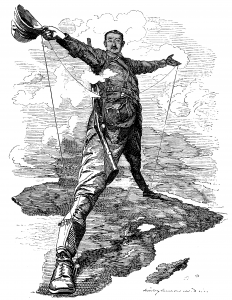Skip to main content


table of contents
Notes on Eurocentrism
Eurocentrism
The Rhodes Colossus: Caricature of Cecil John Rhodes, after he announced plans for a telegraph line and railroad from Cape Town to Cairo
Definition
- World view that privileges the trajectory of Europe over the trajectory of BIPOC
- Progress envisioned as control of nature in pursuit of profit
- Characterizes BIPOC, non-Europeans as inferior to Whites
- Places BIPOC in a mythical state of nature. Rousseau’s “Savage”
- Refers to colonization of BIPOC as a “White Man’s Burden” to save the “savages” from themselves and “help” them to “progress”
Eurocentric Myths
- Human civilization is seen as a trajectory that departed from a state of nature and culminated in Europe. All other experiences are deemed as “pre-civilized” or “primitive” or “underdeveloped”
- The differences between Europe and non-Europe are naturalized, and racialized, that is, blamed on the “race” of BIPOC. This racialization constitutes an erasure of past atrocities committed by imperial armies and the Catholic Church. Racializing and normalizing these differences allows Europe to hide the results of Europes’ imperialism and colonization. It hides how European countries depleted non-Western areas of their wealth and their people, through the forced extraction of natural resources and the enslavement of their population.
Part One Video Lecture
A YouTube element has been excluded from this version of the text. You can view it online here: http://openbooks.library.umass.edu/radicalsocialtheory/?p=178
Media Attributions
- Punch Rhodes Colossus © Edward Linley Sambourne is licensed under a Public Domain license
- Timeline of European Colonization © Graciela Monteagudo is licensed under a Public Domain license